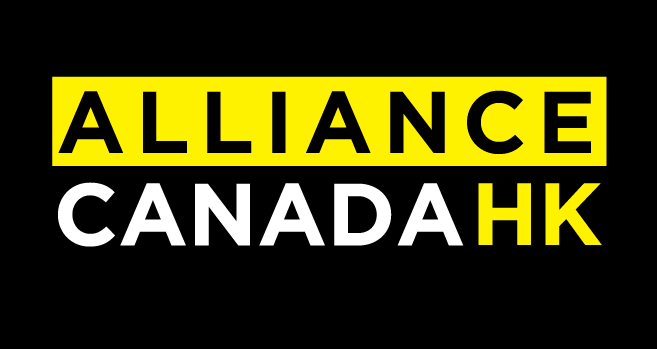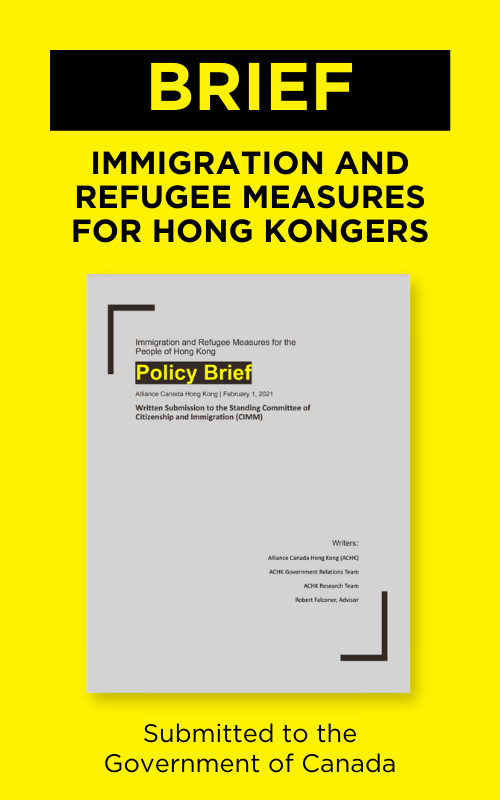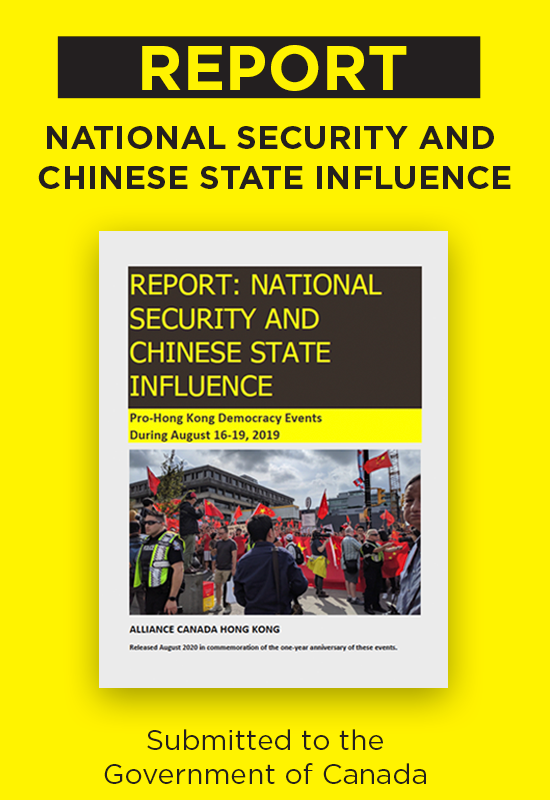On Tuesday August 11th, ACHK’s Davin Wong and Cherie Wong testified in front of the Special Committee on Canada-China Relations.
A video of their testimony is available here:
The full video of the day’s testimonies is available on parliament’s website here.
A transcript of Davin and Cherie’s testimony is reproduced below.
Davin’s Testimony:
My name is Davin Wong. I am the Director of Youth Engagement and Policy Initiatives of ACHK, and the former President of the Hong Kong University Students’ Union (HKUSU) until I fled Hong Kong. I would like to thank the committee for the invitation to testify.
I understand my privilege as a Canadian-Hong Konger, and it is my duty to speak up. Though I am speaking to you as a Canadian citizen, I am at risk. The Hong Kong government has already issued warrants for six overseas advocates for “secession” and “colluding with foreign countries” under the National Security Law, one of which is an American citizen advocating to their own government.
The National Security Law destroys Hong Kongers’ capacity to express opposing opinions. It is also used to disqualify candidates and hijack the LegCo election. My friends and activists are feeling the chilling effects under this draconian law. HongKongers now depend on international allies to hold Beijing and Hong Kong governments to account.
Last year, as a student leader involved in the pro-democracy movement, I had been harassed, threatened and intimidated. On August 30, 2019 at around midnight, I was followed, beaten up and wounded by a man in white t-shirt — that is a dress code known for pro-Beijing thugs. Three other activists were brutally attacked on the same day.
I did not go to the hospital after the attack. Hospitals are dangerous spaces for activists, as it was exposed that the police set up backdoors to the Hospital Authority’s system to track down hospitalized protestors. At the time, HKUSU had set up an underground clinic with voluntary doctors and medical students for protesters who are in need of medical help.
I also did not seek help from the police. Why would I? As an activist, the police treat me as an enemy. I have witnessed their abuse of powers and human rights violations. I have witnessed mass arrests – one in 10 of my friends had been arrested on bogus charges. I have carried a friend who was shot in the stomach by the police. I have had guns pointed at me, and I still vividly remember the smell of tear gas. The Hong Kong Police Force arrested medics and reporters; protestors were beaten, raped, tortured and denied due process. You know what my friends and I would carry to the protests? Our wills, because we feared that we would never see the sunlight again.
After the attack, I immediately booked my ticket at 3 PM and hopped on the plane at 7 PM. I knew fleeing Hong Kong was a one-way trip, but I still naively believe I might have a slight chance to return. And the National Security Law killed it. Our advocacy work here can get us arrested under the broad definition of “collusion with foreign countries.” We are not safe even in Canada, as we have seen dissidents abducted by Beijing in other countries. The fear is real.
Regarding the National Security Law, Beijing’s claims of extra-territorial jurisdiction over acts committed by non-Hong Kong residents outside of the territory is amplifying Beijing’s global authoritarian ambitions. This committee should also pay attention to Beijing’s long arms and the interference that is already effectively undermining our freedoms in Canada.
While I am not an expert in national security, I witnessed their tactics especially in academia and student activism. The Liaison Office was a major financial supporter of the Chinese Students and Scholars Association in Hong Kong universities. HKUSU was also once infiltrated by students trained by pro-Beijing groups. We worry that this kind of interference is already happening in Canada.
Hong Kong’s freedoms and autonomy have been destroyed. Journalists are guarding the last remnants of freedom of press and information, but the owner of Apple Daily, one of the most reliable sources in Hong Kong, was arrested under the National Security Law two days ago. The situation is urgent and we’re running out of time.
I ask Canada to immediately offer a safe haven for Hong Kongers, to curb the CCP’s malicious influence campaign at home, and to work with our allies to hold the Chinese and Hong Kong governments to account.
Thank you again for letting me share my experience. I look forward to your questions.
Cherie’s Testimony:
Thank you Mr. Chair. My name is Cherie Wong, I use she/her pronouns.
I was born in Canada and raised in post-handover Hong Kong. I am honoured to be asked to speak here today, as a Hong Konger and as a Canadian.
I am the co-founder and Executive Director of Alliance Canada Hong Kong. ACHK is a volunteer-led and multi-partisan national collective of 18 community groups across 10 Canadian cities.
Since the start of Hong Kong’s democratic movement, I have received death and rape threats, with implications to harm my family. During the launch week of ACHK, I received an ominous phone call to my hotel landline in Vancouver, saying they are coming to collect me. Though the room was booked by another person, they still managed to find me.
On October 1st, 2019, I co-led a protest on Parliament Hill with Ottawa Stands with Hong Kong. Days before the demonstration, we received online threats. At the protest, we were physically and verbally assaulted, threatened, and harassed. Over 100 pro-Beijing supporters were mobilized quickly, they surrounded and kettled us.
While the Ottawa Police were called to escort us, pro-Beijing groups took photos and videos of us and continued to follow us even as we drove away. After the protest, many of us were doxxed, our private information was maliciously published.
Canadians across the nation are forced to hide their identity or be targeted by pro-Beijing forces. What is even more worrying – these interference campaigns are emboldened by Chinese diplomats in Canada. Tong Xiaoling, the Consul General in Vancouver has called on ethno-nationalistic unity as an attempt to assert control over the Sino communities.
Hong Kong is not only a foreign issue, which is why our demands are not only about advancing and striving for Hong Kong’s democratic future, but also reflects ongoing issues facing Canadian communities.
Alongside Citizen Press Conference, we consulted with 13,000 Canadians and Hong Kongers through a survey to inform Canada’s five demands of action.
- Provide humanitarian support for Hong Kongers, Uyghurs, Tibetans, Chinese, and other communities fleeing the Chinese Communist Party – the CCP
- Invoke sanctions against Chinese and Hong Kong officials for human rights atrocities
- Protect Canadians’ constitutional rights and freedoms from erosion
- Investigate and combat foreign interference into Canadian institutions
- End all exports of military/police goods and technology
While we commend the decision to suspend sensitive military exports to Hong Kong, Canadian education institutions continue to be in a vulnerable position for trading funds for intellectual properties. Three Canadian universities are in the top 10 list in collaborating with the People’s Liberation Army: McGill University, University of Waterloo, and University of Toronto.
Foreign-state influence is deeply rooted in various aspects of Canadian society, including academia, media, social media, student communities, private sector, education and political institutions. It has become clear, there is a coordinated campaign to infiltrate and influence Canadian society – this is a part of the CCP’s global authoritarian agenda.
There is overwhelming support in Canada to stand against human rights atrocities. Co-signed by 27 community leaders and supported by 75 Parliamentarians from all major political parties – we are calling on the government to invoke Magnitsky-style sanctions, in collaboration with other middle powers.
The CCP has shown complete disregard for international rules. State suppression has only accelerated under the guise of COVID-19. Since the implementation of the national security law, the CCP is using oppressive tactics that are used in Tibet and East Turkestan. Notably, on the first day under the national security law, authorities have started to collect DNA from those who were arrested in Hong Kong.
There is persistent characterization that Hong Kongers readily have the resources to immigrate and all Hong Kong protestors are young. In reality, many do not have the material means to leave and may not qualify through regular pathways. We have a short window to act, before the CCP completely shuts down the freedom of movement in Hong Kong.
As for Canada’s role in Hong Kong’s democratic movement, I hope you can agree: The democratic future must be of the people, by the people, for the people of Hong Kong.
Before wrapping up, I want to acknowledge the narrative that the CCP has created: an illusion of net-benefits in trading with China. It is naive to expect them to change. Time and again, the CCP has used trade as a weapon. It is absolutely crucial that Canada begins diversifying our trade and economic relations with countries committed to democractic development and upholding human rights.
Thank you again for inviting me to speak here today. I look forward to your questions. I hope we can offer insights to advance Canadian interest in this larger discussion of Canada-China relations.


